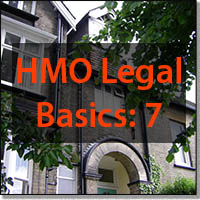 The HMO Legal Basics series is a collaboration between Tessa Shepperson and David Smith of Anthony Gold Solicitors. An HMO is a House in Multiple Occupation.
The HMO Legal Basics series is a collaboration between Tessa Shepperson and David Smith of Anthony Gold Solicitors. An HMO is a House in Multiple Occupation.
This is the second part of our article on the Management Regulations. In the first article we looked at what they were and the landlords obligations.
Today we look at tenants obligations and enforcement.
Tenants’ responsibilities
You will be pleased to learn (if you are a manager of a House in Multiple Occupation) that it is not just landlords who have obligations under these regulations. They go on to say that occupiers must
- not hinder or frustrate the manager in the execution of his duties,
- allow managers access at reasonable times,
- provide managers with any information they may reasonably require,
- take care with and not damage anything the manager is bound to maintain under the regulations,
- deal with rubbish as required by the landlord, and
- comply with any reasonable instructions from the manager as regards fire safety.
However, it seems that few Local Authorities actually do much to prosecute tenants and they will generally expect landlords to have attempted to resolve the issue themselves.
Enforcement
The explanatory note at the foot of the regulations states:
A person who fails to comply with these Regulations commits an offence under section 234(3) of the Housing Act 2004, punishable on summary conviction with a fine not exceeding level 5 on the standard scale.
This means a fine of up to £5,000 (although in practice it is usually in the region of £1,500 – £3,000).
However, note that this is a fine PER OFFENCE and it is normal for prosecutions to be brought for a large number of charges, often as many as 15. So these relatively small fines can rack up to a substantial sum.
Prosecutions are brought in the Magistrates Courts by Local Authority Housing Officers.
Practical points
The main point to remember about these regulations is that they are intended to ensure active management of the HMO property.
In many residential lettings managers are content, and perfectly entitled, to take a laissez faire approach, only dealing with problems as they are reported by the tenants.
However in an HMO property, if you don’t do anything until it is reported to you, you will then ALREADY be in breach and vulnerable to prosecution.
So you need to do more visits than you would for a non HMO property and take a more direct involvement in how your tenants use the property.
Keep logs of all your visits and the problems you found, with clear records showing how you dealt them.
This is essential if you are to have any chance of proving you have been managing the property properly and that any problems found (e.g. in a Local Authority inspection) are down to poor tenant behaviour.
Too often managers have little or no written records and have just given verbal warnings and discussions, which tenants then deny. You MUST be able to provide letters and/or other written material to prove how you have complied with the regulations.
Conclusion
It is important to realise that these regulations apply to ALL HMOs, not just to a House in Multiple Occupation which needs a license.
There have been prosecutions of non-licensed HMOs. Although on the whole, Local Authorities tend to target licensed HMOs.
Generally Local Authorities will usually carry out a Housing Health and Safety Rating System (HHSRS) inspection before bringing any prosecution and will give a landlord a chance to rectify problems.
If this happens to you, make sure you deal with things and don’t let them drift. If you are prosecuted this could result in the loss of your license.
In the next article we will be looking at licensing.
Further HMO resources:
![]() Advice: If you need some legal advice, for example if you have issues with your HMO tenants and need advice, you can use our ‘HMO Hotline‘ telephone advice service.
Advice: If you need some legal advice, for example if you have issues with your HMO tenants and need advice, you can use our ‘HMO Hotline‘ telephone advice service.
![]() Training: Easy Law Training has regular workshops on HMO Law & Practice. You can read about these >> here (you will need to scroll down to find out the dates).
Training: Easy Law Training has regular workshops on HMO Law & Practice. You can read about these >> here (you will need to scroll down to find out the dates).